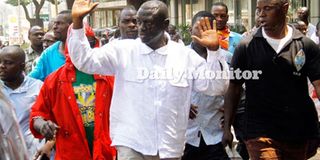Besigye leads in 14 districts as more results trickle in

FDC presidential candidate Kizza Besigye (raising hands) calms his supporters shortly before he was arrested at Jinja road in Kampala recently. Photo by Abubaker Lubowa.
Kampala: Forum for Democratic Change (FDC) presidential Candidate, Dr Kizza Besigye has made gains in the latest (No.6) provisional results by the Electoral Commission (EC).
Dr Besigye who continues to trail the incumbent, Yoweri Museveni jumped from 32.66 per cent to 34.3 per cent with Mr Museveni’s lead slipping from 62.8 per cent to 61.3 per cent of the 5,151,070 total votes so far counted.
The development is a result of some of the votes from Dr Besigye’s strongholds starting to form part of the tally.
The 14 districts where he leads Mr Museveni are Gulu, Kalangala, Kasese, Lira, Masaka, Mbale, Rukungiri, Soroti, Tororo, Sironko, Wakiso, Amuru, Serere and Ngora.
At 61.3 per cent (3,156,070) of the 5,145,695 counted so far, president Museveni enjoys a comfortable lead over his opponents. To win the elections one requires 50 plus one per cent of the total number of votes cast.
Despite several hiccups that saw the elections in some areas of Wakiso and Kampala districts postponed, EC chairman Dr Badru Kiggundu promised to declare the winner within the mandatory 48 hours as prescribed by the law.
Meanwhile, the rest of the six fringe candidates continue to post negligible results.
Mr Abed Bwanika of the Peoples Development Party has so far polled 51,150(0.99%) of the valid votes cast. Independent presidential candidate Amama Mbabazi stands at 88,900(1.73%), Prof Venansius Baryamureeba 33,135(0.64%), Farmers Party of Uganda Mr Benon Biraaro at 15588(0.30%), Joseph Mabirizi at 14,745(0.29%) and Ms Maureen Kyalya at 24,536(0.48%). In total, the votes they have garnered are less than the invalid votes which currently stand 264,518(4.88%) of the total votes cast.
Reports in the run up to the February 18 polls faulted the EC for not carrying out voter and civic education something the EC continues to dismiss.
“I don’t think we have 100 per cent literacy and readership and these are the challenges we are having and it might remain the same. We don’t want it as so and I think as the commission we did what was required in terms of voter education,” Dr Kiggundu said.




